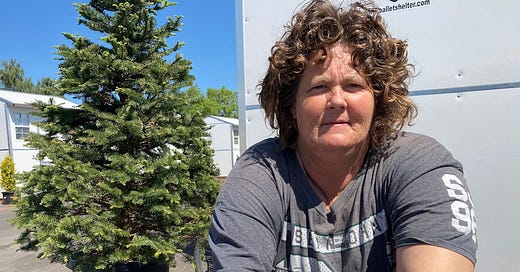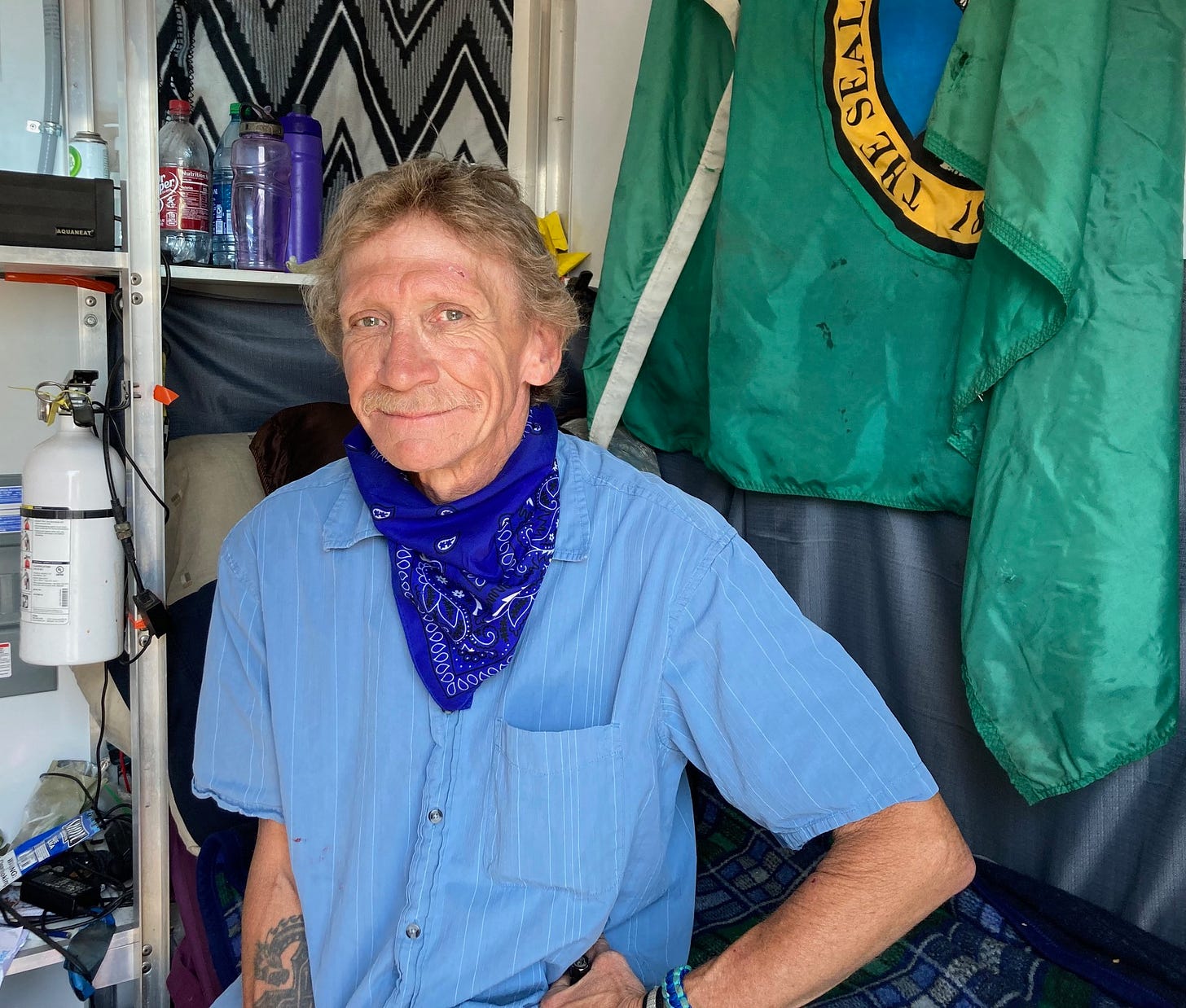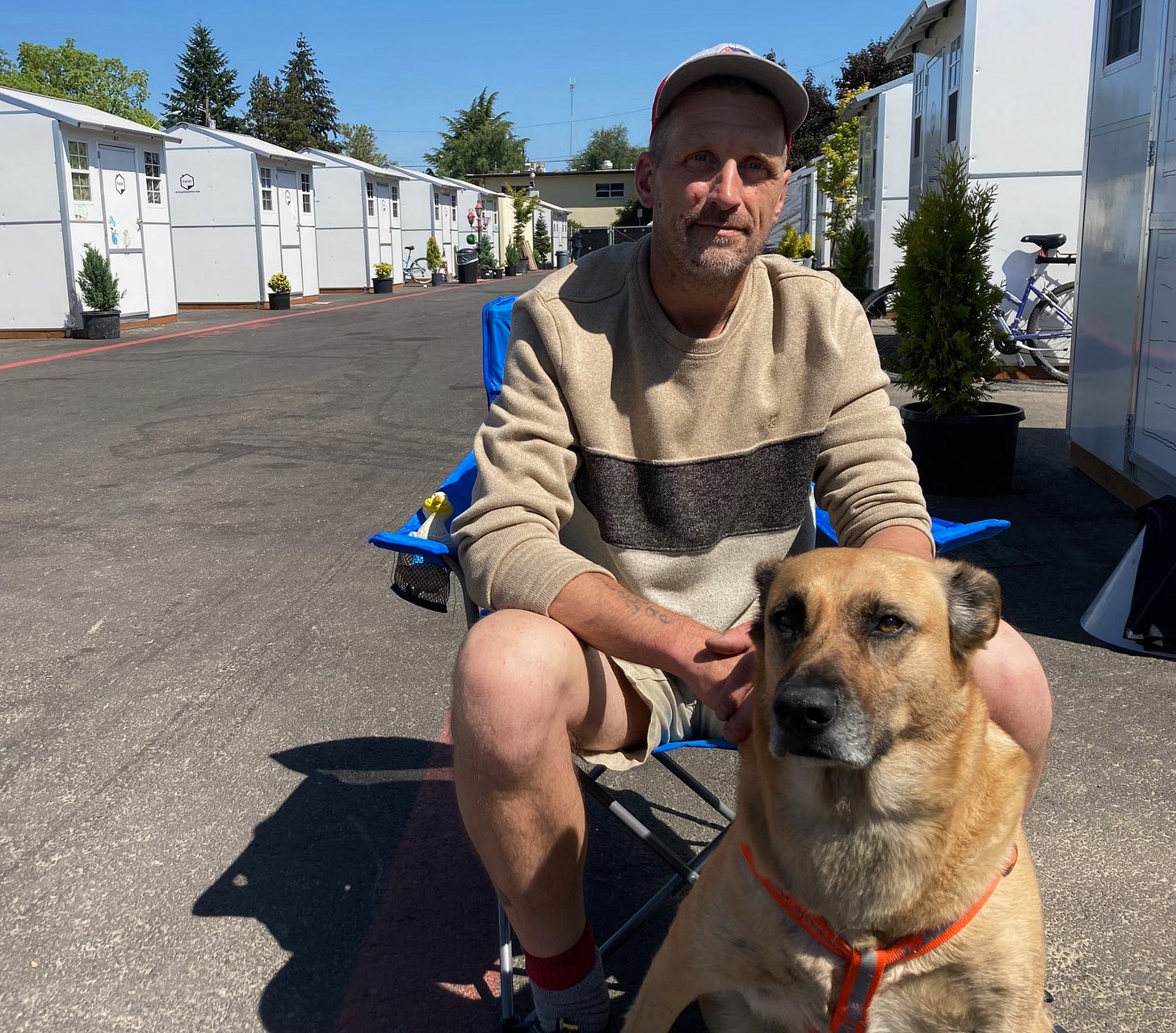Epic tales of misfortune; hopes for recovery
Hope Village residents tell their tales; critics should listen
If anyone should have fears about living in Hope Village, Melissa Elmer would be the one.
Elmer, a resident at the Alabama Street pallet home community for five months, was one of several village residents who responded when William Jay Grimm was stabbed, allegedly by a fellow resident, at about 10:25 p.m. the night of April 3.
Grimm, who lost his forearm as a result of the attack, was bleeding profusely. Elmer and other residents applied pressure to his wounds to help control the bleeding until medics arrived. Village supervisors say Grimm likely would have perished had the residents not responded.
Despite the bloody experience, Elmer, 46, was happy at Hope Village. The former Arizona truck driver and gas station manager had been assaulted several times during her years of homelessness, the last three in Longview. One attack left her with massive cuts to her scalp. She also lost the front part of her foot to frostbite one cold night.
“Sleeping on the street is not safe,” said Elmer, who has a bright, open face, a big mop of curly hair and stout forearms. “I lived on a streets for 15 years. It was horrible, atrocious.”
“I feel safe here,” she said in a June 2 interview.
Melissa Elmer is a Hope Village success story. She recently found permanent housing after living on the streets for 15 years.
Having a small, prefabbed home at Hope Village made it safe to sleep off her medicines for schizophrenia, said Elmer, who found permanent housing last week. “And you get privacy.”
The stabbing was a public relations setback for Hope Village. It added fuel to the neocons’ effort to sabotage one of the city of Longview’s marquee efforts to address homelessness.
The critics fail to acknowledge that the project IS giving hope to the unsheltered, has a long waiting list for admission and has dramatically reduced vandalism and crime that was linked with the unsupervised, squalid tent city that stood at the same location for the previous three years.
“I have no interest in funding the debacle they call Hope Village," Cowlitz County Commissioner Rick Dahl said in April, when he and fellow Commissioner Arne Mortensen declined a city and Salvation Army request for $740,000 to help fund Hope Village operations. "They just moved the criminal element out to other areas. They haven’t solved the problem, just pushed it around.”
Critics have declared political war on the Longview City Council for funding Hope Village, alleging that it costs too much, is unsafe, attracts bad people and that homeless people still are camped around town. They are calling for the ouster of council members who voted for it, which was every member except for Spencer Boudreau. The issue is likely to dominate this year’s campaigns for four City Council seats.
Meanwhile, the city is trying to figure out how to continue to pay for the pallet community without the support of the county commissioners or the area’s legislative delegation. (As I reported earlier, state Sen. Jeff Wilson, R-Longview, yanked $2.5 million funding for Hope Village when he learned it had been included in the state Capital Budget. Wilson is an ally of Mortensen and Kalei LaFave, who is challenging incumbent City Councilman Mike Wallin this fall.)
The ongoing controversy prompted me to visit Hope Village on June 2 and meet residents themselves as well as officials running it. I found Hope Village far from being a “debacle,” even if it alone can’t solve the homeless problem.
Four residents who agreed to speak on the record with the supervision of case manager Hollie Hillman assured me that they feel safe, that they are thankful for a chance to repair their lives and are resentful of Dahl’s characterization of them as criminals.
These are basically good people, each with an epic tale of misfortune, substance abuse, mental health struggles and, sometimes, brushes with the law. What they want is a chance to put their lives back on track. Hope Village — which has a waiting list of 150 people —is giving them that.
“I had three businesses and owned a home” in Longview before relapsing into alcohol abuse during the pandemic, said Daniel Spisla, 57, a village resident for four months.
He’s got a 2006 Clark County conviction for third-degree assault, but, he says, “I’m not a scandalous person.”
He called Dahl’s statement about criminal elements there “a shit sandwich.”
Daniel Spisla hopes to eventually move out of his Hope Village home, shown here with the Washington state flag, and back to his fire-damaged Longview home.
Spisla had been homeless since an electrical fire damaged his home on West Canyon View Drive in Longview two years ago. He’s married, but his wife has been in court-ordered hospitalization for mental health treatment for most of the past 17 months.
Spisla most recently he’d been a self-employed chimney sweep in Longview and he also was the registered agent for Smokin & Chokin Vape LLC, now dissolved. He’d like to move back into his home once he resolves an insurance dispute over the fire damage. Hope Village has given him shelter and a chance to mend his life, he said.
“This lady here is totally freakin’ awesome,” Spisla said, speaking of Hillman, one of the two Salvation Army case managers at the site.“This is a great spot for people to get it back together.”
Hope Village, a supervised community that the city opened in mid December, consists of 50 prefabbed “pallet” homes. It’s a gated and only staff and residents are allowed in. Clients get two meals a day, counseling and assistance to find jobs, medical care and permanent housing. They’re taught how to budget money and be good neighbors.It’s modeled after other pallet communities that have been successful in Vancouver, Seattle and Tacoma, among other places.
It cost the city of Longview $1.15 million to build Hope Village, and the city has authorized $1.4 million for the Salvation Army to run it for a year.
Only Cowlitz County residents 18 and older are allowed to live there, and they can stay as long as they obey the rules and work to rebuild their lives. (Residency is determined through public assistance records and other documentation, such as driver’s licenses.)
Drugs and weapons are banned, and rooms are searched daily, according to Hillman. Residents themselves are sometimes searched, but they do not undergo criminal background checks.
Through May, 117 people have lived at Hope Village, and 17 had found permeant housing. Another 55 have been expelled, mostly for drug use or drug possession. After a month they are eligible to apply for readmission, and some have be allowed to do so, Hillman said.
The camp has not become a magnet for homeless from outside the area. Longview Police Chief Robert Huhta, who once served on the board of the Community House on Broadway, says counts consistently show about 85 percent of the local homeless people here are residents of Cowlitz County.
“ I went to high school with some of them,” said Huhta, a lifelong local resident.
Jennifer Andrews, 39, and her husband are lifelong local residents living at Hope Village. They lost their home due to drug and alcohol abuse and have been homeless for two years. She’s done jail time for several offenses, including heroin possession and theft.
They’d been living in their car, parking overnight in Gerhart Gardens Park and elsewhere during the night until entering Hope Village three months ago.
Staff at Hope Village “are helpful. There are lots of different programs to help you get jobs and treatment,” Andrews said.
She said she is undergoing a mental health assessment and alcohol addiction treatment. Her husband is getting drug treatment and recently interviewed for a pulp and paper mill job, Andrews said.
Another Village resident, who was undergoing drug treatment, moved into Hope Village in February and worked part time at an auto repair shop. He got a full-time mill job last month. “He is focusing on his housing search while maintaining sobriety,” according to a city report that only identified the man as “AR.”
Hope Village is dotted with potted shrubs and picnic tables and is completely paved. It’s spare but tidy, like the surrounding business neighborhood. A brigade of five to 10 village residents does a street trash pickup every Sunday.
It’s also quiet and orderly. Through May, Longview police had responded to 13 calls for service to that location since the pallet home community opened six months ago. They made hundreds to the tented encampment there during the previous three years.
From a police perspective, Hope Village is a “drastic” improvement over the old camp, Huhta said.
James Batchelder, inside sales manager for Matheson Gas nearby at 148 Oregon Way, said problems with litter, drug use, nudity, human waste and trespassing linked to the unsupervised tent camp have vanished in the the company’s neighborhood. Matheson, which sells welding supplies, had considered shutting its Longview location down after BB shots were fired at employees from the former camp.
The situation is “100% better,” he said. “It’s paradise now compared to what it was a year ago.”
A manager for Matt’s Meats Tuesday declined to comment on the situation. The owner had complained repeatedly to city officials last year about trash problems, sexual propositioning and confrontations with staff by the residents of the former unsupervised camp.
Hillman, the Hope Village case manager, said she has not heard complaints from Matt’s. “None whatsoever,” Hillman said, adding that she’d like to hear about them if there are.
The April 3 stabbing is , of course, impossible to ignore. The case is progressing the suspect, Roger Edward Curiel, 43, of Longview. He is charged with first-degree assault with a deadly weapon. A hearing date to. set a trial date is scheduled for June 15.
Police have not found a weapon in April 3 stabbing, but Grimm’s injuries are consistent with knife wounds, Chief Huhta said.
That Curiel may have been able to smuggle a knife into the village is not surprising in that people booked into the Cowlitz County Jail are occasionally able to do the same despite more thorough searches there, Huhta said.
Hillman, the case manager, said, “The reality is that this place is really safe. That incident was so out of nowhere. We never have fist fights. You can get shot anywhere — like a movie theater or a school.”
Hope Village resident Edwin Newberg, 49, is finding the community a safe haven — from himself. He’s said he has been depressed and suicidal. He and his dog — a Shepard/Catahoula mix named “Felony” — have been homeless more than two years.
He said he has worked extensively in construction as a safety specialist. A 2015 divorce in Clallam County slammed him financially, saddling him with large child support obligations, he said. Overwork led him to alcohol abuse and job losses. He ended up in the local area because his stepmother lives here.
Edwin Newman and his canine friend, Felony, pose outside their pallet home at Hope Village.
His eyes, which he says have shed lots of tears, are those of a man who looks defeated and unsure of himself. Mentally, he said, he’s still not ready to work full time, though he wants to one day. He’s been taking odd jobs, including some roofing work last week. But the staff’s main concern now is with Newberg’s mental health, Hillman said.
“I don’t want to take a job and not be reliable,” Newberg said. “Mentally, it’s a real struggle. I’ve had always been “Mr . Reliable.’ ”
Hope Village is giving him a chance to stabilize himself. “Felony” — a name she already had when Newberg adopted her —remains with him, sharing their tiny cubicle at Hope Village. “She’s everything to me.”
Critics of the project point to homeless campers at the Longview Civic Center and elsewhere as evidence that Hope Village is not working.
But with only 50 beds, the community is not big enough to handle all who need help. It’s like complaining that a one gallon jug can’t hold 10 gallons of water.
In addition, it often takes multiple attempts at treatment to cure drug and alcohol addiction. So it’s hardly surprising that nearly half the people who have lived at Hope Village so far have been expelled.
Furthermore, the rent crisis makes housing for many of the clients unaffordable and is one of the leading causes of homelessness in the first place.
The stigma of homelessness also is an obstacle. Some landlords will simply not return her phone calls or deny that they have units available, even when she knows for a fact that they do, Hillman said.
“You can’t solve the problem by building 50 ‘pallet’ homes. We are part of the puzzle, but just a piece,” she said.
The critics seem intent on doing nothing except to ship the homeless out of town, which Huhta says is illegal. Arresting them on misdemeanor charges such as possessing stolen shopping carts or illegal camping is a waste of taxpayer money, he said, noting that it costs $95.80 a day to house someone in the jail.
Hope Village residents face many challenges, even after they find permanent housing. Just last week, Melissa Elmer got a room at the Hudson Hotel in Longview at $590 a month. Her only income is a $875 a month disability check. She’ll have to stretch every dollar like Silly Putty.
“I am very confident Melissa will succeed,” Hillman said. “She is connected with supportive services and … is used to living on a very small amount. I think she will do well.”
“I wouldn’t have been able to (get a place) without Hollie,” Elmer said. ”But I need a job with insurance.”
The residents of Hope Village are wounded people, and often some of it is self-inflicted. But there are no throwaway people. And if this community has any compassion and wisdom, it should root for Hope Village and people like Melissa Elmer to succeed.







My niece is living in a old warehouse in Reno and has been homeless on and off for 5 years. Her story is a combination of making bad choices and life events outside her control. I won't go into detail here but most who read this have NO idea what the homeless are up against...none. So if you can't get onboard with a little help and encouragement, please don't make the situation worse with ignorance of the challenges so many homeless people face on a daily basis. It appears a couple of our county commissioners have that covered and need to find their empathy button or find other work.
Informative glimpse into Hope. Thanks so much. I'm sending an expanded copy to 2 nearsighted Cowlitz County Commissioners.